Covid: Frank Turner livestream gigs for struggling venues return
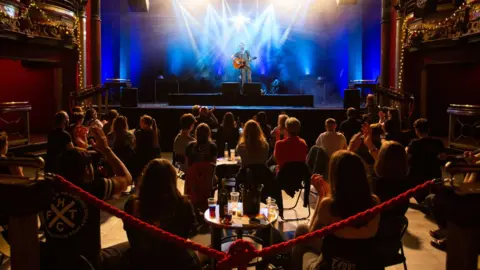 PA Media
PA MediaMusic venues across England have remained largely silent for the past nine months after the coronavirus pandemic forced them to close their doors. As the unwanted anniversary of a year without live music approaches for some, musician Frank Turner is once again picking up his guitar to help.
"If you had told me back in March last year," says Frank Turner, "that this issue was going to go on for this long I would have been very depressed."
The folk-punk singer has played more than 2,500 gigs in his 15-year solo career and sold out venues across the world, including Wembley Arena.
But he has also performed in scores of small independent venues and credits each one with getting him to where he is.
So when amplifiers and microphones fell silent in 2020, he livestreamed 14 free gigs from his home in aid of those venues, raising nearly £200,000 in donations.
"The bottom line is that venues have not been able to open their doors," says Turner.
"They've not been able to sell tickets, they've not been able to sell alcohol to punters, and therefore their business model remains completely on ice."
Now, as the third lockdown bites, he is restarting his weekly shows in support of the Music Venue Trust's #Savethe30 campaign to help UK venues identified "at imminent danger of permanent closure".
"It's the same predicament that pubs are in but with an extra added layer of awfulness," says Turner.
"It's difficult to exaggerate how difficult it is for these places."
Turner is not alone in his efforts to support struggling businesses and last year the government unveiled the £1.57bn Cultural Recovery Fund (CRF), but not all venues have been eligible.
'It doesn't work without the music'
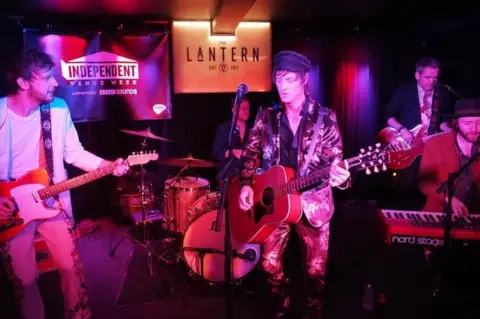 David Pickles
David PicklesOpened in November 2017, owner and session musician Ben Adey said he set up The Lantern as "there was never anywhere to play in Halifax".
The purpose-built, 130-capacity venue - which Turner will perform in support of later - was unable to apply for a grant as it had not been trading for long enough.
Mr Adey said it had been "successful, going well", before Covid hit.
"Everything just stopped, there was nothing coming in, but the rent and the overheads don't stop," he said.
An attempt to reopen as a bar when restrictions allowed was not viable.
"It was built as a live music venue as opposed to being a bar," he said.
"Without the live music element it just doesn't work."
A crowdfunding campaign launched last year has so far raised more than £20,000, and Mr Adey said he hoped Thursday's show would help with "getting to dry land" and give people something to look forward to.
'Twenty people better than none'
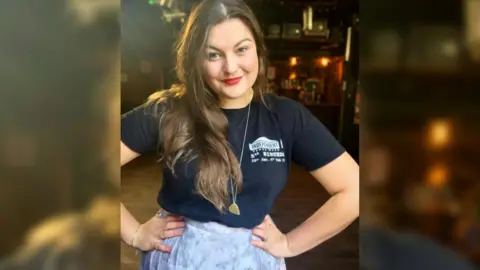 Elisabeth Carley-Leonard
Elisabeth Carley-LeonardElisabeth Carley-Leonard owns The Shed, in Leicester, which has been closed since 20 March due to extra restrictions in the city.
Turner's livestream last April raised more than £11,000 for the venue.
"We were hoping to raise maybe £5,000 or £6,000 and it kept going up and up; even after the livestream finished donations kept coming in. I still get goosebumps thinking about it," she said.
The funds raised "took the pressure off significantly" and "made the world a better place for a fleeting moment", she added.
However, with monthly overheads nearing £6,000, the money soon went and the joy of not having to make staff redundant in April became a "horrible" reality in September when the venue had "about £20 left in the bank account".
But, the following month it was awarded a £50,000 grant from the CRF.
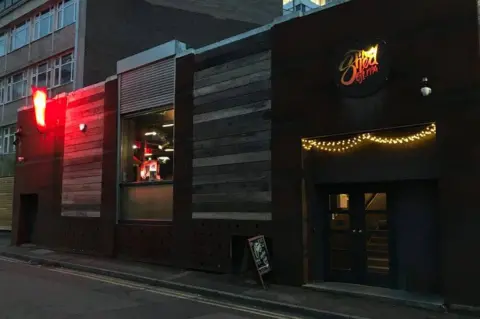 The Shed
The ShedMs Carley-Leonard now has her sights set on reopening on 1 April "come hell or high-water" to mark the fourth anniversary of the Shed's reopening under her stewardship.
She hopes to welcome punters back to the venue on Friday and Saturday nights at first, though with capacity reduced from 100 people to 20.
She said she was trying to see lockdown as a chance to "start from scratch", adding: "Even if it's only 20 people at a time, that's better than no people."
'When can we have live music back?'
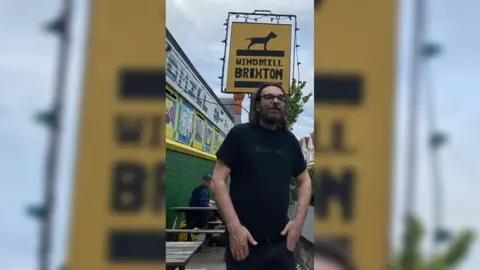 Tim Perry
Tim PerryThe 150-capacity Windmill, in Brixton, is another venue named on MVT's "at risk" list and was also ineligible for CRF support.
But while The Lantern and The Shed either chose to or were forced to stay shut, venue booker Tim Perry said he was keen to put on as many gigs as possible last year.
When restrictions in the capital allowed it, the venue took advantage of London's tier two status and staged about 90 reduced-capacity gigs, sometimes fitting in two a day.
Mr Perry said: "We knew we were going to lose money but we thought we would be losing less money if we put on some gigs.
"It felt like an important thing to do.
"We were crowdfunding, asking people to support the venue so if we sat there with the doors closed it would have been a bit hypocritical."
He said the venue had set a target of £56,000 to see it through to the end of March, though that figure had not included a third lockdown.
Like Turner, Mr Perry said the issue for venues now was a need for clarity from the government on when they can reopen.
"It's not just when either," he said, "it's when can we have live music, what will the capacity be, will there be a curfew?"
'A guerrilla warfare operation'
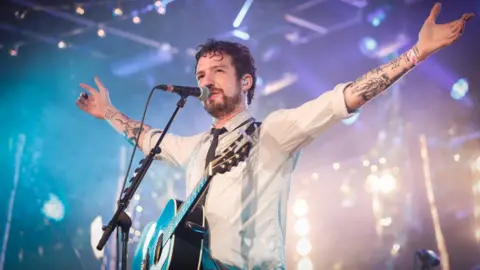
Turner, who last year took part in a socially distanced trial show aimed at exploring how venues might reopen, said the industry needed a definitive restart date and called for a coronavirus insurance scheme to protect against "false dawns".
Mark Davyd, CEO of the Music Venue Trust, said his team was working on a case-by-case basis to help all 900 venues it represents, with particular focus on the 30 most at risk.
Reacting to the potential impact of each new announcement was like running "a guerrilla warfare operation", he said, and they feared the worst-affected would be gone before Christmas.
But thanks to the Save Our Venues campaign launched last April and other projects, none of the 900 venues had closed and about half were "safe" till 31 March, Mr Davyd said.
And while there was a "dark air" around the return of large-scale gigs and festivals returning in 2021, the possibility of events at smaller venues felt "a lot more likely", he said.
He hoped socially distanced events could return in March or April while full reopening, with restrictions in place, may be possible "by the middle of the year".
A spokesperson for the Department for Culture, Media and Sport said more than £168m has been awarded to 650 music venues from the CRF and applications were being accepted for the latest round until 26 January.
Meanwhile, talks about insurance between government officials and music industry representatives continue.
For Turner, helping the venues he cares so much about with his livestreamed performances had helped him through the first lockdown, giving him "structure and purpose".
But they also taught him a painful lesson.
"Drinking a beer and watching some live music is a magic, magic thing and I miss it terribly".

Follow BBC Yorkshire on Facebook, Twitter and Instagram. Send your story ideas to [email protected].
